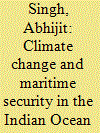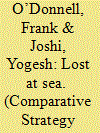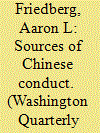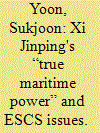| Srl | Item |
| 1 |
ID:
134681


|
|
|
|
|
| Summary/Abstract |
Amidst international furor over its annexation of Crimea, Russia quietly acquired a far more lucrative territory through different means: in March, the United Nations recognized Russia's claim to the resource-rich “Peanut Hole” in the center of the Sea of Okhotsk. This strategically and economically important body of water—a “real Ali Baba's cave” of untapped oil and gas reserves—lies within a contentious triangle formed by eastern Russia and northern Japan. Securing the Okhotsk's legal status as an internal sea goes far to advancing Russian claims in the Arctic, and bolsters Russia's bargaining position over four disputed Kuril islands which Japan callsits “Northern Territories.”
|
|
|
|
|
|
|
|
|
|
|
|
|
|
|
|
| 2 |
ID:
136777


|
|
|
|
|
| Summary/Abstract |
Climate change is likely to influence maritime security in the Indian Ocean Region (IOR). The growing unpredictability in climate and weather patterns is having a disproportionate impact over the region. Not only is the IOR predicted to bear the brunt of future climatic changes, it is also likely to face strong constraints in meeting the coming threats. The effect of climate change on human security in the IOR is only likely to be matched by the impact of extreme weather conditions on naval operations and the security of maritime assets. This article argues that changing climate could take the form of a structural challenge that regional maritime forces will need to prepare systematically to tackle effectively.
|
|
|
|
|
|
|
|
|
|
|
|
|
|
|
|
| 3 |
ID:
136359


|
|
|
|
|
| Summary/Abstract |
Alongside its Indian Ocean naval escort fleet, China is also investing in naval and maritime presence across the African continent. John Stupart discusses the prominent focus on West African in particular.
|
|
|
|
|
|
|
|
|
|
|
|
|
|
|
|
| 4 |
ID:
135756


|
|
|
|
|
| Summary/Abstract |
The US navy is continuing efforts to improve the integrated ship self-defence capability of its non-aegis fleet, Richard Scott Report
|
|
|
|
|
|
|
|
|
|
|
|
|
|
|
|
| 5 |
ID:
135534


|
|
|
|
|
| Summary/Abstract |
The article focuses on the maritime strategy of China claims 10,250 nautical miles of coastline and more than 6,500 islands. Topics discussed include influence of strategists Alfred Thayer Mahan and Julian Corbett on present Chinese maritime strategies, views of admiral J. C. Wylie on sea power, and emphasizing relationship among national naval power, economic development and international relations in the strategy.
|
|
|
|
|
|
|
|
|
|
|
|
|
|
|
|
| 6 |
ID:
136360


|
|
|
|
|
| Summary/Abstract |
Professor Geoffrey Till considers whether the free use of the sea is a right that will be challenged – or supported – by China ‘s continuing emergence as a maritime power.
|
|
|
|
|
|
|
|
|
|
|
|
|
|
|
|
| 7 |
ID:
135842


|
|
|
|
|
| Summary/Abstract |
India's first nuclear-armed ballistic missile submarine, the INS Arihant, signifies a milestone in its rise to power. However, its development and supportive strategic discourse reveal the absence of an Indian grand strategy. India urgently needs a grand strategy to direct its defense policy.
|
|
|
|
|
|
|
|
|
|
|
|
|
|
|
|
| 8 |
ID:
135028


|
|
|
|
|
| Summary/Abstract |
Transit traffic on the Northern Sea Route (NSR) has increased considerably in the last few years, in relative terms. There is no clear pattern of transit cargo on the NSR and little indication that cargo owners or shipping companies have committed themselves to use of this sea route for the longer term. An important exception to this picture is the Yamal LNG (liquefied natural gas) project, which will be based on year-round use of the NSR. Administrative procedures have improved and escort fees have become competitive, but are not transparent. The future capacity of the icebreaker fleet is being questioned, and so is the need for icebreakers. Also, Russia lacks an integrated policy for the NSR.
|
|
|
|
|
|
|
|
|
|
|
|
|
|
|
|
| 9 |
ID:
136351


|
|
|
|
|
| Summary/Abstract |
Union maritime security strategy is helping members states understand and solve their collective security challenge at sea
|
|
|
|
|
|
|
|
|
|
|
|
|
|
|
|
| 10 |
ID:
136635


|
|
|
|
|
| Summary/Abstract |
Starting in 2009, an increasing number of foreign observers (and many Chinese as well) began to note a shift towards more forceful or “assertive” behavior on the part of Beijing.1 Among the most frequently cited indications of this trend were:
An internal debate among Chinese elites in which some participants advocated edging away from Deng Xiaoping's “hiding and biding” strategy and replacing it with something bolder and more self-confident;2
A “newly forceful, ‘triumphalist,’ or brash tone in foreign policy pronouncements,”3 including the more open acknowledgement—and even celebration—of China's increasing power and influence;
Stronger reactions, including the threatened use of sanctions and FINANCIAL leverage, to recurrent irritations in U.S.–China relations such as arms sales to Taiwan and presidential visits with the Dalai Lama;
More open and frequent displays of China's growing military capabilities including larger, long-range air and naval exercises, and demonstrating or deploying new weapons systems;
A markedly increased willingness to use threats and displays of force on issues relating to the control of the waters, air space, surface features, and resources off China's coasts. These include ongoing disputes with the Philippines and Vietnam (among others) in the South China Sea, with Japan in the East China Sea, and with the United States regarding its conduct of surveillance and military exercises in areas from the Yellow Sea to the vicinity of Hainan Island.
|
|
|
|
|
|
|
|
|
|
|
|
|
|
|
|
| 11 |
ID:
136358


|
|
|
|
|
| Summary/Abstract |
China’s economic footprint in Latin America has grown fast. Dr. Laurence Allan discusses how a higher profile naval presence and interest in port projects underline Beijing’s desire for a stronger maritime strategy for the region.
|
|
|
|
|
|
|
|
|
|
|
|
|
|
|
|
| 12 |
ID:
135754


|
|
|
|
|
| Summary/Abstract |
The Indonesian navy sees itself as instrumental in helping to realise Indonesia’s vision of becoming a maritime power. Ridzwan Rahmat describes the transformation taking place to enable the service to support this aim.
|
|
|
|
|
|
|
|
|
|
|
|
|
|
|
|
| 13 |
ID:
134249


|
|
|
|
|
| Summary/Abstract |
Australia's relations with its neighbours in the South Pacific challenge theories of international relations and foreign policy analysis. Most existing analysis eschews an explicitly theoretical approach in favour of empirical description and ‘common sense’ explanations. Yet repeated patterns of interaction suggest that there is scope for developing a more theoretical understanding of the relationships between Australia and the Pacific islands. Moreover, lying at the margins in several dimensions of interstate relations, these relationships test theories and thus provide a basis to delimit or refine them. This article explores three important ways in which theories of international relations and foreign policy analysis and the study of Australia–Pacific island relations can benefit each other. First, Pacific island resistance to the projection of Australian power tests theories about the tactics available to ‘micro-powers’. Australia's frequent reorientation of and regular distraction from its approach to the Pacific islands provide evidence about ‘under-institutionalised’ policy making. Finally, the interaction of Australia's global ‘middle power’ status with its regional dominance challenges ideas of ‘middle power leadership’ and ‘strategic personalities’. These three insights lead to novel hypotheses about the conduct of foreign policy by non-great powers under conditions of extreme asymmetry.
|
|
|
|
|
|
|
|
|
|
|
|
|
|
|
|
| 14 |
ID:
136507


|
|
|
|
|
| Summary/Abstract |
In recent years, U.S. officials have grown increasingly fearful of a massive cyberattack, one capable of crippling infrastructure and crashing MARKETS. In 2010, William Lynn, then deputy secretary of defense, wrote in these pages that cyberspace was “just as critical to military operations as land, sea, air, and space.” As defense secretary, Leon Panetta warned of a “cyber–Pearl Harbor.” And in 2013, James Clapper, the director of national intelligence, put cyberattacks at the top of his annual list of transnational threats.
|
|
|
|
|
|
|
|
|
|
|
|
|
|
|
|
| 15 |
ID:
136361


|
|
|
|
|
| Summary/Abstract |
Tate Nurkin considers the impact on the US – China – Asia-Pacific balance of a number of naval challenges and competition emerging in the Western Pacific Ocean
|
|
|
|
|
|
|
|
|
|
|
|
|
|
|
|
| 16 |
ID:
135494


|
|
|
|
|
| Summary/Abstract |
Why are first responders so often unprepared for large-scale disasters? Proper preparation requires innovative thinking, and many times the obvious is overlooked.
|
|
|
|
|
|
|
|
|
|
|
|
|
|
|
|
| 17 |
ID:
136542


|
|
|
|
|
| Summary/Abstract |
Xi Jinping's conception of “true maritime power” is intertwined with a set of complex issues: internal factors concerning the legitimacy of Xi's regime and external factors such as territorial disputes in the East China Sea and the South China Sea (ESCSs) which concern sovereignty. The nations of the region must consider the implications of China's approach and its impact on the region: Is it possible to influence China by standing together?
|
|
|
|
|
|
|
|
|
|
|
|
|
|
|
|